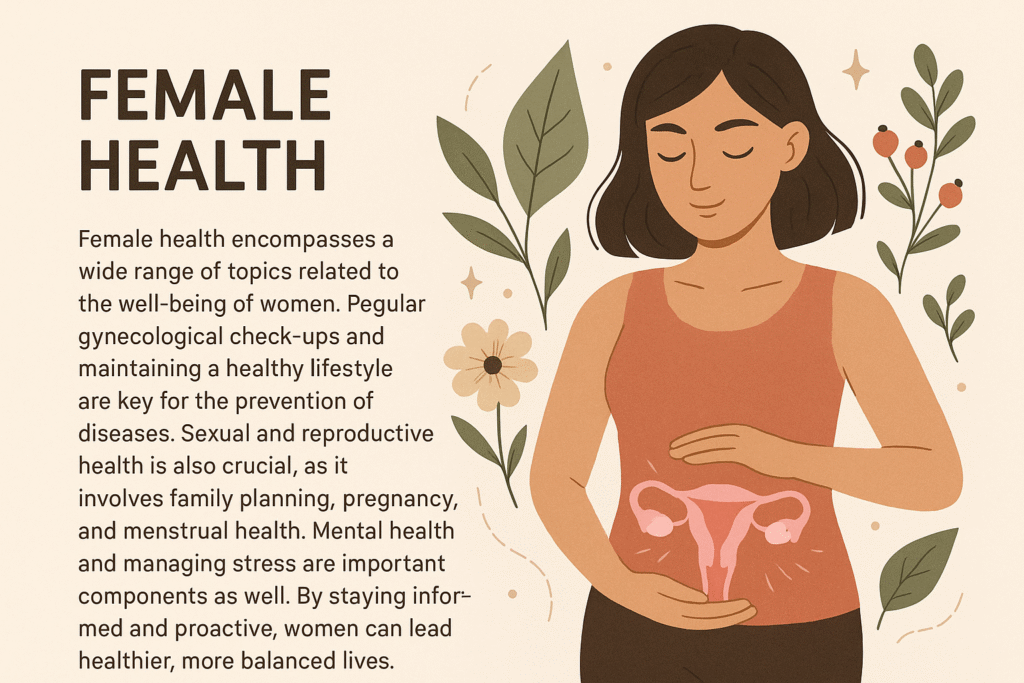
Discover a comprehensive guide to female health—covering reproductive wellness, menstrual care, mental health, and lifestyle habits. Empower your well-being with practical, science-backed tips.
Female health is a multifaceted subject that spans physical, emotional, hormonal, and mental well-being. As women move through different life stages—puberty, reproductive years, perimenopause, and menopause—their health needs evolve. Understanding these changes and taking a proactive approach is essential to living a vibrant and balanced life.
In this in-depth article, we’ll explore the key aspects of general female health, including reproductive health, menstrual wellness, nutrition, exercise, mental health, and preventive care. Whether you’re in your twenties or approaching your fifties, this guide offers actionable insights to help you make empowered health choices.
—
1. Reproductive Health: Foundation of Female Wellness
Reproductive health is central to a woman’s overall health and includes everything from menstruation to fertility and menopause.
Menstrual Health
A healthy menstrual cycle typically ranges from 21 to 35 days. Irregular periods, heavy bleeding, severe cramps, or missed periods may be indicators of underlying conditions such as:
Polycystic Ovary Syndrome (PCOS)
Endometriosis
Uterine fibroids
Thyroid imbalances
Fertility and Family Planning
Fertility health should be monitored even if pregnancy isn’t an immediate goal. Lifestyle factors, stress, and age all impact fertility. Options for family planning include:
Hormonal birth control
IUDs
Fertility tracking apps
Natural family planning
Discussing options with a healthcare provider ensures you choose a method that aligns with your health goals and values.
Menopause and Perimenopause
Perimenopause typically begins in the 40s and brings hormonal changes like mood swings, hot flashes, and irregular periods. Managing symptoms involves:
Hormone replacement therapy (HRT)
Herbal supplements like black cohosh
Regular exercise and balanced nutrition
—
2. Nutrition for Female Health: What to Eat and Why
A woman’s nutritional needs shift throughout her life due to hormonal changes, pregnancy, and aging.
Key Nutrients Every Woman Needs
Iron: Especially important during menstruation to prevent anemia.
Calcium and Vitamin D: Essential for bone health, especially post-30.
Folate: Crucial before and during pregnancy to prevent birth defects.
Omega-3 Fatty Acids: Supports brain health and hormone production.
Magnesium: Helps reduce PMS symptoms and supports heart health.
Balanced Eating Habits
Incorporate whole foods, such as:
Leafy greens, beans, nuts
Lean proteins (chicken, fish, tofu)
Whole grains (quinoa, oats)
Healthy fats (avocado, olive oil)
Avoid highly processed foods, excess sugar, and trans fats to reduce the risk of obesity, diabetes, and heart disease.
—
3. Exercise: Moving for Strength and Hormonal Balance
Staying active is vital for female health. Exercise not only maintains physical fitness but also supports hormonal balance, mental clarity, and cardiovascular health.
Ideal Exercises for Women
Cardio (30 mins daily): Brisk walking, swimming, cycling
Strength Training (2–3 times a week): Boosts metabolism and maintains bone density
Yoga and Pilates: Improves flexibility, reduces stress, and enhances pelvic floor strength
Exercise and Hormones
Regular movement helps regulate estrogen and progesterone, reducing PMS symptoms and easing the menopausal transition.
—
4. Mental Health: The Often Overlooked Component
Mental well-being is a core pillar of female health, influenced by hormonal shifts, societal pressures, and personal responsibilities.
Common Mental Health Challenges Among Women
Depression and anxiety (especially during PMS, pregnancy, postpartum, and menopause)
Body image issues
Chronic stress and burnout
Support and Coping Strategies
Therapy: Cognitive Behavioral Therapy (CBT), EMDR, or group counseling
Mindfulness: Meditation, journaling, and deep breathing
Support Networks: Friends, family, and women’s groups
—
5. Sexual Health: Empowerment Through Awareness
Sexual wellness is not just about intimacy—it’s about bodily autonomy, confidence, and safety.
Important Sexual Health Practices
Regular STI screenings: Especially if you have multiple partners
Open communication with partners: About preferences, consent, and contraception
Understanding your body: Know what’s normal and when to seek help
Common Sexual Health Concerns
Low libido (often linked to stress or hormonal imbalances)
Pain during intercourse (could indicate vaginal dryness or other conditions)
Vaginal infections (maintain healthy pH and hygiene)
—
6. Preventive Health: Screenings and Checkups You Shouldn’t Skip
Regular health checkups can detect potential issues before they become major problems.
Key Screenings for Women
Pap Smear (every 3–5 years): Detects cervical cancer
Mammogram (after age 40): Early detection of breast cancer
Bone Density Test (post-menopause): Prevents osteoporosis
Pelvic Exams: Helps monitor reproductive organ health
Thyroid Function Tests: Especially important with fatigue or weight changes
Vaccinations
HPV vaccine (if under 45)
Tetanus booster every 10 years
Annual flu shots
COVID-19 boosters, as recommended
—
7. Female Health Across Life Stages
Teens and Early 20s
Focus on menstrual education and body image
HPV vaccination and STI awareness
30s and 40s
Family planning, fertility preservation, and stress management
Begin regular mammograms and thyroid checks
50s and Beyond
Bone health, menopause support, and heart disease prevention
Screenings for colon, breast, and uterine cancers
—
8. Lifestyle Habits That Support Holistic Female Wellness
Sleep
Aim for 7–9 hours of quality sleep each night. Poor sleep increases cortisol, disrupts hormones, and weakens immunity.
Hydration
Drink at least 2–3 liters of water daily. Staying hydrated supports metabolism, skin health, and hormonal regulation.
Limit Alcohol and Tobacco
Both can disrupt hormone production and increase cancer risks. Reducing or avoiding them enhances long-term health.
Routine and Rest
Balancing work, family, and personal time is critical. Prioritize rest days, digital detoxes, and self-care rituals.